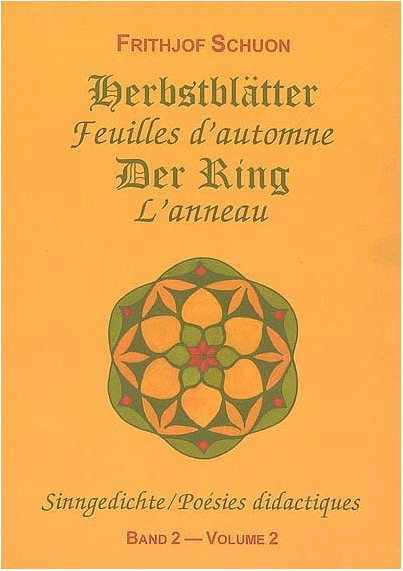
Frithjof Schuon Archive

Statements and Texts
| Title | Summary | Publication Data | Dated |
|---|---|---|---|
| Extract from “The Substance” | The substance of knowledge is Knowledge of the Substance; in other words the substance of human knowledge is Knowledge of the divine Substance; “he who knoweth his soul knoweth his Lord”. | Logic & Transc. p.236 |
Featured Books
Herbstblätter & Der Ring
The German sense poems of Frithjof Schuon form a metaphysical and spiritual whole that unites the essential teachings of this master in a form as accessible as it is immediate.
Featured Poems
Adastra and Stella Maris: Poems by Frithjof Schuon-Purification
Water purifies; many rites
Adastra and Stella Maris: Poems by Frithjof Schuon-Philosophy
Sophists were the creators of wrong
Adastra and Stella Maris: Poems by Frithjof Schuon-The Origin
Primordial Water is, for Thales, God;
Featured Articles
Frithjof Schuon and the American Indian Spirit: Interview with Michael Fitzgerald
It is generally recognized that Frithjof Schuon had a special interest in the spiritual traditions of the American Indians, but only some aspects of his relationship with them are well known. The online journal Vincit Omnia Veritas, which published six issues between 2005 and 2007, interviewed Michael Fitzgerald on the subject of Schuon’s many decades of interest in, and study of, American Indian spirituality in its many dimensions. This interview, posted on the Religio Perennis website, remains one of the most in-depth explications of Schuon’s frequent focus on many aspects of American Indian traditions. Fitzgerald also gives some important historical context to the life and times of Schuon, to his American Indian contacts and friends, and to the work of Joseph Epes Brown, a scholar of Indian Studies and a friend to both Black Elk and Schuon.
Thoughts on Reading Frithjof Schuon’s Writings on Art
Introduction to “Frithjof Schuon: Messenger of the Perennial Philosophy”
The “Introduction” to Frithjof Schuon: Messenger of the Perennial Philosophy covers a summary of the three dimensions of Schuon’s work (comprehension, concentration, conformation), a brief discussion of how his own life was led in the light of these dimensions, and then presents the essential elements of Schuon’s message in some further details. These elements are discussed under sections titles “Metaphysical Truth,” “Life of Prayer,” and “Moral Conformity.” Besides Fitzgerald’s explication, his points are reinforced by extensive quotes from Schuon’s unique prose, and his poetry.
